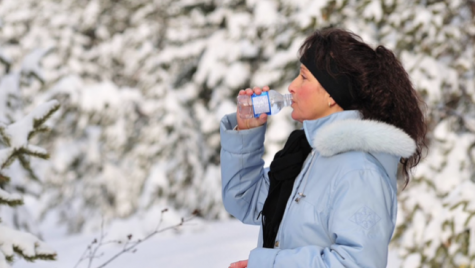Importance of Hydration in Winter
December 14, 2020
When one hears the word “dehydration,” they often do not associate it with the crisp air and chilly winds that accompany December’s arrival. However, to many people’s surprise, it is much easier for one to get dehydrated in the winter than it is in the summer. The combination of the lack of thirst and invisible sweat formulates the unfortunately ideal condition for one to become dehydrated.
In the cool weather, one’s water consumption level significantly reduces. Naturally, people tend to become less thirsty than they would in the summer, prompting them to drink less water compared to the amount recommended for their health. What many people fail to remember is that appearing less thirsty is not equivalent to being hydrated. Over time, this means that the total amount of water taken in by the day has significantly dropped from the warmer seasons; eventually, the untreated lack of water in the body leads to dehydration. While the water intake rate decreases, the water secretion rate dramatically increases. When the air around the skin grows cooler, breathing in and out cold, dry air notably increases the amount of fluid lost from the body. Additionally, the sweat one may secrete instantly turns into vapor, meaning that the individual is unaware of their sweat. Without the sweat as an indicator, many do not realize that they need to refuel their tank. As they continue to lose more and more fluid to sweating, breathing, and even urination, they quickly approach dehydration. It is crucial to remain vigilant regarding signs of apparent dehydration: these include dizziness, fatigue, dry skin, and dark-colored urine.

As a result, it is extremely important for one to stay hydrated when exercising in the cool weather. Because exercising produces more sweat and often leads to heavy breathing, the person is even more susceptible to dehydration. If they do not intake the essential amount of water, it is possible that they could be rapidly nearing dehydration without themselves even knowing. As we walk deeper into the winter season, we must all remember to drink water throughout the day and be on the lookout for any signs of dehydration!


